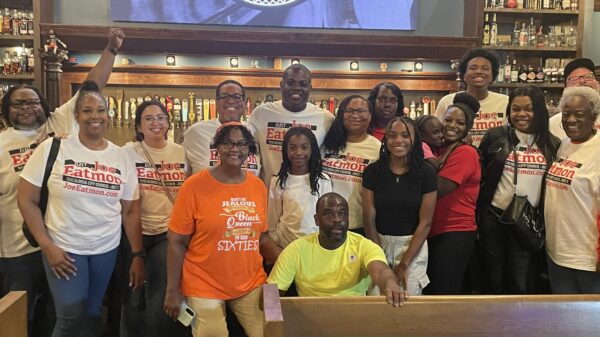|
Getting your Trinity Audio player ready...
|
Most any top 5 list is necessarily incomplete by dint of the format, and this one is no exception. This year I’ve written dozens of stories that I feel are incredibly important, on topics as varied as fuel economy standards, abortion access, and state unemployment rates, but writing a Top 5 stories of 2024 list does unfortunately require picking just five stories. So, with that caveat out of the way, here are the stories I felt were the most important and impactful:
Mercedes workers in Vance tried to win a union election
Starting off my time at APR with a piece about a pro-union rally in Tuscaloosa was a real example of synchronicity. Mercedes employees’ attempt to unionize with the United Auto Workers really exemplified the wider struggles of organized labor in the last couple years reflected by the UAW’s Stand-Up Strike, the dockworkers’ strike, and the unionization of 27,500 public school workers in my home state.
Inspired by the remarkable success of the Stand-Up Strike, Mercedes workers in Vance launched an organizing campaign in late 2023 and publicly announced it in January. Basically every politician in the state from Governor Kay Ivey to state House Majority Leader Scott Stadthagen took to the airwaves and the op-ed pages to argue against unionizations, characterizing the UAW as an outside force.
Most memorably, a Mercedes worker accused Tuscaloosa city councilor and reverend Matthew Wilson of insulting Martin Luther King Jr. during an anti-union junket. Wilson recorded an anti-union video for Mercedes and made a visit to the plant where he personally discouraged unionization. In an email and call to me, though, Wilson strenuously disputed the claims that he had disparaged King and stated that King’s Poor People’s Campaign was not intended to help people making as much as Mercedes employees.
When I and several other journalists from national and international outlets talked to pro-union workers midway through the election, they were still remarkably optimistic about their odds. But once all the votes were tallied, the union ended up falling 597 votes short. Pro-union workers attributed the loss to politicians’ anti-union statements, the behavior of management, and the last minute replacement of an unpopular CEO.
The union also repeatedly criticized Mercedes’ conduct leading up to and during the election itself, filing a bevy of unfair labor practice charges with the National Labor Relations Board, most of which remain open. In late May, they announced that they would be seeking a rerun of the election. And in June, UAW president Shawn Fain lambasted Mercedes for allegedly blaming the unionization campaign for the company’s inability to fulfill promises to employees.
Between the still open unfair labor practice charges and the potential for another campaign, UAW organizing might be a story to keep watching in 2025. In Fain’s concession speech, he said he assured Mercedes management that the UAW will “be back in Vance.”
And while workers at the Hyundai plant in Alabama haven’t reached the stage of filing for a union election yet, and may not, they also kicked off a unionization campaign early this year. I got to report on Poor People’s Campaign founder Reverend William Barber, other religious leaders, and Hyundai workers gathering in the Immanuel Presbyterian Church in Montgomery to make the case for unions.
Alabama children and the workplace
Whether children should be put to work in Alabama’s factories and restaurants was a hotly contested topic this year. In May, the state legislature passed, and Ivey signed, a bill making it easier for 14- and 15-year-old children to work by removing grade and school attendance requirements. Memorably, Representative Berry Forte, D-Barbour, said there “wasn’t no such thing as child labor back in the day” and Representative Brett Easterbrook, R-Fruitdale, opined that restrictions on child labor lead to “rebellious kids who know nothing.”
But even if there wasn’t no such thing as child labor back in the day, the federal Department of Labor sure thinks there is some in Alabama today. They’ve filed two lawsuits alleging that Alabama companies engaged in oppressive child labor in contravention of the Fair Labor Standards Act.
One lawsuit, against Mar-Jac Poultry of Alabama, alleged that the company illegally hired five or more children, with some working on the killing floor — a charge which the company strongly disputed. The other lawsuit, against Hyundai and other suppliers, focused on a 13-year-old who allegedly worked “up to 50 to 60 hours a week” on the assembly line. In a recent filing, the Department of Labor revealed that attention was first drawn to her when she went missing and an Amber Alert was issued. She was found with an adult coworker in Georgia.
Both lawsuits have faced strenuous pushback from the companies accused. Mar-Jac filed and then withdrew a hefty counterclaim, and Hyundai has been alleging that acting secretary of labor Julie Su is occupying her post unconstitutionally. There has also been some skepticism from the judiciary. Early in the Mar-Jac lawsuit, Judge L. Scott Coogler questioned both whether the work children were tasked with constituted “oppressive child labor” and the Department of Labor’s chosen appearance and mannerisms test.
Both lawsuits will continue into the new year, and almost certainly into the incoming presidential administration. It remains to be seen how President-elect Trump’s appointees to lead the Department of Labor will handle the ongoing cases.
New Flyer voluntarily recognizes the IUE-CWA in Anniston
This story likely flew under your radar, but the timing really makes it stick in my mind. On May 8th, the state House passed a bill that will prevent any companies that voluntarily recognize labor unions from receiving economic incentives from the state. Alabama AFL-CIO president Bren Riley came out strongly against it, calling it an “ALEC bill” that was “stuck up Tennessee’s ass last year” and “stuck up Georgia’s ass earlier this year.” But in an interview with me, Riley said he didn’t actually remember any examples of voluntary recognition in the state.
Which makes it all the more striking that later that month, New Flyer, a bus manufacturing company, voluntarily recognized the International Union of Electronic, Electrical, Salaried, Machine, and Furniture Workers at their Anniston plant. After a majority of workers signed union cards, the IUE-CWA suddenly represented about 600 New Flyer employees, no election required. And then they negotiated a union contract with double digit pay increases, cost of living adjustments, and better retirement benefits.
Acting secretary of labor Julie Su even visited the New Flyer plant, telling a meeting in Birmingham the next day that those “kinds of jobs can be the jobs and must be the jobs of the future if we do our work together, and if we do it right.” That much praise from a cabinet member when New Flyer would have faced serious economic consequences for voluntarily recognizing the IUE-CWA just a few weeks later has really stayed with me.
Republicans crusade against transgender healthcare and “wokeness”
This isn’t exactly a new phenomenon in Alabama politics, but I covered a lot of stories about Republican politicians attacking access to gender-affirming care or perceived “wokeness” in different public institutions this year.
Senator Tommy Tuberville provides perhaps the most prominent examples. Continuing his crusade against abortion access in the military, Tuberville penned an op-ed in June arguing that wokeness was responsible for declining military recruitment numbers. Later that month, he introduced a package of amendments to the CHIPS Act that he sold as rolling back “woke regulations.” He specifically proposed repealing programs meant to combat sexual harassment at recipients of CHIPS Act funding and funding for climate change research. And earlier this month, Tuberville accused researchers who received federal funding from the NIH in order to research puberty blockers of withholding data.
Alabama Attorney General Steve Marshall has also used his public office to attack perceived wokeness and the availability of gender-affirming care. In July, I reported that Marshall’s office requested almost $1 million to pay a Washington, D.C. law firm to assist with the Boe v. Marshall case, where Marshall is defending limiting transgender children’s access to healthcare. And in September, Marshall and two other state AGs submitted an amicus brief arguing that employers should be able to select healthcare plans that refuse to cover gender-affirming care for their workers.
Notably, these stories all exist in the context of an ongoing national legal battle around states’ ability to ban gender-affirming care and the regular murder of transgender teens. This year I also wrote about advocacy organizations’ reactions to the death of a transgender teen in Mobile, a Florida ban being initially deemed unconstitutional, and oral arguments before the Supreme Court in United States v. Skrmetti.
Injustice in the Alabama justice system
One of my first stories this year was a piece about a bill from Representative Jim Hill, R-Moody, that would let judges choose to split sentences between prison time and probation. It failed to pass, stuck in the House, but Hill has already introduced similar legislation for the 2025 legislative session. While the bill failed to pass, the prison overcrowding that inspired it was a topic I would return to repeatedly over the last year.
Parole rates are one of the factors most often blamed for prison overcrowding. While approval rates are higher this year than they were in 2023, they are still markedly below several other states. This year I wrote about the failure of a lawsuit against the Alabama Department of Corrections over racial disparities in parole rates and the denied parole application of a prison reform advocate.
I also wrote several stories about conditions in Alabama’s jails and prisons. In Autauga, the county sheriff and Autauga County Commission fought over jail conditions in June. The sheriff, Mark Harrell, evacuated the county jail on June 6th, citing his “moral obligation for the safety, health and security of all individuals who come through the doors of the Autauga County Metro Jail.” During a commission meeting, Harrell and his lawyer alleged that necessary parts of the jail’s infrastructure, like the fire alarm system and control boards, were nonfunctional. The commission maintained that they were on top of needed reforms and evacuating the jail put Autauga residents at risk.
And during the Joint Prison Oversight Committee’s annual public hearing in July, Alabamians complained about the flow of drugs into the state’s prisons, their family members being killed while incarcerated, and the need for prison reform focused on rehabilitation. One man, Tim Mathis, told the committee he “had no idea at the time that took place [his son’s sentence] was going to turn into a death sentence at the hands of the ADOC.”
But thankfully I also got a chance to write about a glimmer of hope for Alabama’s incarcerated population. The Southwest Alabama Partnership for Training and Employment was awarded a $1.5 million grant by the U.S. Department of Labor to help the formerly incarcerated reintegrate into society.
With dozens of bills pre-filed with the state legislature’s judiciary and public safety commissions, proposals for reform will be one thing to watch during upcoming months.















































